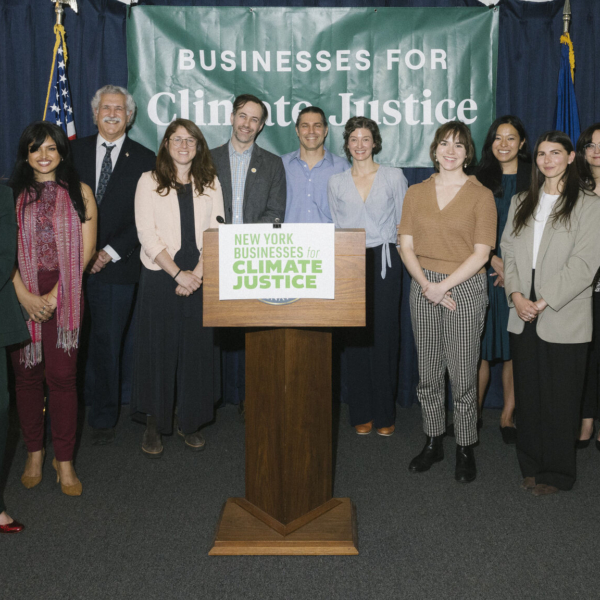How California Businesses and B Corps Are Coming Together for Climate Justice
May 13, 2025
As wildfires and other climate disasters drive up costs for California communities, a coalition of businesses is demanding accountability from the fossil fuel industry. B Corps such as Seventh Generation are meeting with policymakers to advocate for the Polluters Pay Climate Superfund Act.
Recovery from the recent devastating wildfires in Southern California will cost an estimated $250 billion. And that price to rebuild homes, businesses, and other infrastructure is only the beginning. Even as the thousands of Californians affected by the January fires attempt to pick up the pieces, the climate conditions that contributed to the disaster continue to escalate.
As insurers abandon the state due to heightened wildfire risks and other factors, communities and businesses will face rising costs for insurance, housing, utilities, and health expenses. State and local budgets do not have the capacity to absorb these costs, nor do the residents and business owners who must foot these rising bills. One alternative is emerging through legislation: Advocates for the Polluters Pay Climate Superfund Act say California taxpayers should not be footing the bill for environmental damage. Instead, they are calling for the fossil fuel companies that have contributed to the climate crisis and profited from the damaging industry to account for their impact.
These advocates include the California Businesses for Climate Justice coalition, founded by Certified B Corporation Seventh Generation with B Lab U.S. & Canada. The coalition formed in March, and the Polluters Pay Climate Superfund Act is the coalition’s advocacy focus for 2025. Olivia Clark, of Seventh Generation’s Advocacy & Movement Building team, said the company is aligning its business behind a decarbonization strategy and backing the legislation because it knows that a safe and livable future depends on a swift and global move away from fossil fuels.
“We believe if you make a mess, you have to clean it up,” Clark said. “In this instance, that mess is the climate crisis, and the fossil fuel industry is largely to blame. The Polluters Pay Climate Superfund Act is a common-sense, business-aligned solution that ensures communities aren’t left footing the bill for wildfires, floods, and extreme heat.”
The efforts are an example of collaborative advocacy in the Government Affairs and Collective Action Impact Topic within the new standards for B Corp Certification. This Impact Topic requires B Corps to support collective social and environmental movements. Part of B Lab’s theory of change includes the idea that companies must act beyond their own interests and have a broader systemic impact.
Top photo: B Corp leaders recently headed to the California Capitol to voice their support for the Polluters Pay Climate Superfund Act. From left are Robert Dugan of Here I Am, Olivia Clark of Seventh Generation, Alyssa Kluge of Thrive Market, David Jaber of Climate Positive Consulting, Grace Mausser of B Lab U.S. & Canada, Kristin De Simone of Thrive Market, and Michael Bronner of Dr. Bronner’s.

A Guide to Government Affairs & Collective Action in Practice
This guide from B Lab U.S. & Canada provides examples and resources to support collective advocacy efforts in the B Corp community.
Business-Led Trainings and Lobby Days to Make Polluters Pay
Seventh Generation’s Advocacy & Movement Building team, which includes Clark and Kate Ogden, is leading the California business advocacy efforts. Clark said that includes organizing trainings on how businesses can become civically engaged through lobbying and arranging virtual and in-person lobby days with crucial politicians in California. “Within our own brand, we’ve leveraged our communications channels to raise awareness and drive public action in favor of the legislation,” Clark said.
The California Businesses for Climate Justice coalition recently organized a lobbying event in Sacramento to advocate for the Polluters Pay Climate Superfund Act. From similar work in New York and Vermont, Clark said Seventh Generation has already seen firsthand how impactful the business voice can be in building support for holding the fossil fuel industry accountable, and that the work in California held similar promise.
“One of the staffers we met with said that he had never seen a business group lobbying for pro-climate policy,” Clark said. “This illustrates just how groundbreaking and important this work is.”
Business Support Is a Critical Voice for Change
In March, B Local Bay Area, the organization focused on engaging Bay Area B Corps, hosted the kickoff California Businesses for Climate Justice coalition event with B Lab and Fossil Free Media. As a nonprofit media lab that supports the movement to end fossil fuels, Fossil Free Media is helping lead the national Make Polluters Pay campaign.
Sara Shor, Organizing Director at Fossil Free Media, said business support from B Corps and other companies for such efforts has been especially crucial. “Businesses that have advocated on behalf of passing Climate Superfund legislation have been incredibly effective and integral,” Shor said. “In New York, there’s no way that a Climate Superfund would have passed without the support of the businesses for climate justice coalition, and I know that many B Corps were a major part of that.”
In terms of how businesses can get involved, Shor said Fossil Free Media has seen various business advocacy actions prove effective. Those include:
- Writing op-eds for newspapers.
- Signing business letters.
- Meeting with state legislators in lobby meetings on Zoom and in person.
- Getting other businesses to sign on to support the campaign or join lobby meetings.
She said companies speaking in support of the act is particularly important. “Because the business voice in opposition to Polluters Pay Climate Superfund is so strong, having a countervoice that articulates the reason climate change, climate disasters, and fossil fuel companies are bad business and raise costs is extremely helpful,” Shor said.

A Guide to Government Affairs & Collective Action in Practice
This guide from B Lab U.S. & Canada provides examples and resources to support collective advocacy efforts in the B Corp community.
What Is the Polluters Pay Climate Superfund Act?
The Polluters Pay Climate Superfund Act would ensure polluters pay their fair share for the climate damage they have caused in California. Specifically, the bill would direct the California Environmental Protection Agency to complete a climate cost study to quantify total projected damages to the state from 1990 through 2045 caused by fossil fuel emissions, identify responsible parties, and assess compensatory fees on the largest fossil fuel polluters proportional to their emissions from 1990 through 2024. The fees collected will fund projects and programs to mitigate, remedy, or prevent climate change costs and harms.
The bill aims to dedicate at least 40% of the funds to benefit communities hit hardest by fossil fuel pollution. Advocates argue the bill will protect Californians and limit taxpayer costs by funding critical climate solutions, including investments in a clean energy transition, community resilience, home hardening, sustainable infrastructure, and essential workers responding to climate disasters. Vermont and New York enacted climate superfund laws last year, and California is one of several states considering such legislation.
California for Businesses for Climate Justice lays out various reasons businesses should support the bill. They include its ability to protect jobs and promote a sustainable and strong economy, protect staff and business operations, and ensure a fair and competitive market while advancing corporate accountability.
“Holding polluters accountable prevents unfair financial burdens on responsible businesses and taxpayers,” the coalition states in its informational materials. “Responsible businesses are already incurring costs associated with sustainability and reducing climate emissions, taking on higher costs in order to reduce the negative impacts of their business on people and the planet, putting them at a disadvantage compared to industries whose profits come from fueling the climate crisis.”
-

Business Strategy
Collective Action in Practice: How B Locals Are Advocating for Climate and Social Justice
Read More -

Stakeholder Economy
How to Advocate for Policy Change to Support Wider Adoption of Impact Business Practices
Read More -

-

Business Strategy
How B Corps Can Help LA Wildfire Relief Efforts: Take Action in Community
Read More
Sign Up for our B The Change Newsletter
Read stories on the B Corp Movement and people using business as a force for good. The B The Change Newsletter is sent weekly.
